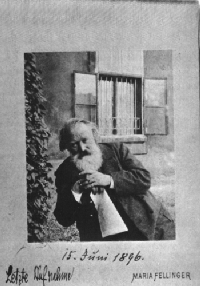|
"Brahms the Progressive"? A look at Arnold Schoenberg's disingenuous essay on BrahmsThe "disingenuous" quality of Schoenberg's essay, written in 1947, is the implicit attempt to demonstrate a link between Brahms' method, and that of the modernists, including Schoenberg himself. Schoenberg explicitly argues in his essay that he should be regarded as a "pupil of Mozart", citing techniques he finds in Mozart (that he also finds in Brahms): "Analysts of my music will have to realize how much I personally owe to Mozart. People who looked unbelievingly at me, thinking I made a poor joke when I called myself a 'pupil of Mozart', must now understand my reasons. This will not help them to appreciate my music, but to understand Mozart. And it will teach young composers what are the essentials that one has to learn from masters and the way one can apply these lessons without loss of personality." The evidence he produces hinges on the use of asymmetrical phrases, an argument which, taken on its own merits, were tenuous; one might just as easily argue that Shakespeare's sonnets are the beginning of Modernism in poetry, because the sentences are not confined to the length of the verses (as in the monotonous sing-song of Dryden), but instead are extended into the next line or lines of verse, in such a way that an ironic tension is created. But, it should be obvious that Shakespeare's method has little in common with the chaotic stream-of-consciousness method that became fashionable in 20th Century poetry. The more essential point to be made, is that such technical aspects of a composer's "vocabulary" are merely characteristic of that composer's solution to the problem of creating a series of ironies, a progression of paradoxes and their resolutions, that evokes in the mind of the listener, a joyful consciousness of its own power of cognition -- assuming that the composer is part of the tradition which flourished from Bach to Brahms, and Schoenberg is not of that tradition. Schoenberg acknowledges, in his essay, an "epoch from Bach to Brahms," but then demonstrates, in his commentary, how little he understands it. Bach pioneered a method of using a dialogue among polyphonic voices to generate a progression of ironies, which is to say, a Socratic dialogue. The opposing school was that of Rameau, where music was an appealing melody, with a procession of chords marching along in lock-step: this is precisely the method of analysis Schoenberg applies in his essay. In contrast to Schoenberg's characterization of Brahms as a "progressive", the great conductor Wilhelm Furtwängler wrote, 13 years earlier, in his essay entitled "Brahms and the Crisis of Our Time": "A function in the sense of 'progress,' the music of his later years did not fulfill. With respect to the disintegrating Tristan-harmony, to the first beginnings of later polytonality etc. stood he, that ever had the purely musical universal-form in view, in opposition. There is little difference between the harmony of Brahms around the 90th year and that of Schubert in the 20th year of the same century. ... And herewith we come to that, which makes the case of Brahms meaningful for us today, which imparts to him nothing short of the most immediate topicality. Brahms is the first great musician, in whose case historical meaning and meaning as an artistic personality no longer coincide: that this was so, was not his fault, but rather that of his epoch." Furtwängler's depth of insight into the music of Brahms is demonstrated by his recordings of Brahms' works. Schoenberg's lack of insight, or perhaps downright antipathy toward Brahms, is best demonstrated by his contemptible orchestration of Brahms' Piano Quartet, Opus 25. Schoenberg illuminates his methodological problem in his essay, when he writes: "Form in Music serves to bring about comprehensibility through memorability. Evenness, regularity, symmetry, subdivision, repetition, unity, relationship in rhythm and harmony and even logic -- none of these elements produces or even contributes to beauty. But all of them contribute to an organization which makes the presentation of the musical idea intelligible. The language in which musical ideas are expressed in tones parallels the language which expresses feelings or thoughts in words, in that its vocabulary must be proportionate to the intellect which it addresses, and in that the aforementioned elements of its organization function like the rhyme, the rhythm, the metre, and the subdivision into strophes, sentences, paragraphs, chapters, etc. in poetry or prose." The more or less complete exploitation of the potency of these components determines the aesthetic value and the classification of the style in respect to its popularity or profundity. Science must explore and examine all facts; art is only concerned with the presentation of characteristic facts. Even Antony, when addressing the Roman people, realizes that he must repeat his '...and Brutus is an honourable man' over and over, if this contrast is to penetrate into the minds of simple citizens... ...Progress in music consists in the development of methods of presentation which correspond to the conditions just discussed. It is the purpose of this essay to prove that Brahms, the classicist, the academician, was a great innovator in the realm of musical language, that, in fact, he was a great progressive." For Schoenberg, repetition of ideas is necessary, because dull-witted listeners will most likely have missed the idea, the first time. For an artist in the Classical tradition, repetition is a means to convey irony, through variation. A few years back, Lyndon LaRouche wrote: "Among the best pedagogical examples of this problem in performance, is the challenge of conducting the second movement of Franz Schubert's Ninth Symphony. One must grasp the principle emphasized by Pablo Casals, that there is no simple strophic repetition in the performance of a great composer's composition, but, in Casals' words, 'always variation.'"
|
